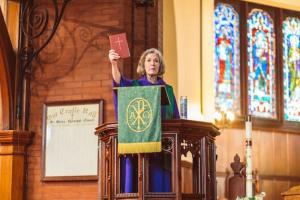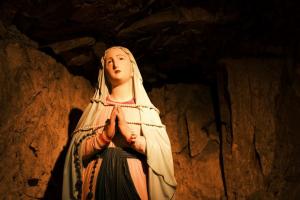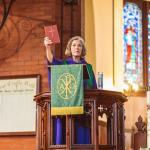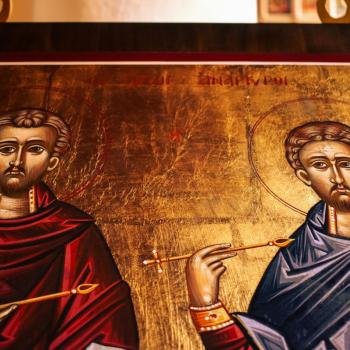An Old White Man Preacher Has a Word for Women Preachers
Luke 1:25 – 56

RDNE Stock project
(A Southern Baptist friend once asked me, “Do you believe in women preachers?” I responded, “Believe in them? I have seen and heard women preachers and I declare to you they are the gifts of God for the people of God.”)
Let’s talk about Mary, the mother of Jesus.
There’s some biblical background material claiming our initial attention. At the outset, Mary enters the scene described simply as “a virgin engaged to a man whose name was Joseph, of the house of David.” Our sexually absorbed culture has little grasp of the “degree to which sexual purity” was valued in the first century. The endless debates over Greek and Hebrew terms for whether Isaiah only meant to say Mary was a “young woman” have been of little value, a distraction in my mind. All this haggling has blinded us to the reality Mary was more than a virgin.
Mary More than a Virgin

I don’t want the fundamentalists stomping their feet from the balcony and insisting on belief in the virgin birth. Nor am I interested in Catholic attempts to keep Mary a perpetual virgin to not face the reality Mary is much more than a virgin. Ancient commentators helped build the prison of virginity around Mary. They claim, with no biblical support, Mary had previously made a vow of perpetual virginity. Face it: When it comes to women, men are slow learners.
Gabriel addresses Mary, not as the world’s vestal virgin, but “Rejoice favored one” (NRSV) or “Rejoice, highly favored one, the Lord is with you, blessed are you among women” (KJV).
What’s unusual is not Mary’s virginity. She would not have been a rarity among first century Jews. The land filled with virgins. What is extraordinary is Gabriel, a male, speaking to an unmarried woman directly. Even more extraordinary are Gabriel’s words. “Highly favored one” was not a usual form of address. This isn’t street talk such as “What’s up good looking lady?” or “What’s happening?”
David Lyle Jeffery, in his Luke commentary, notes the word only occurs in Daniel 10. Gabriel, the same Gabriel that speaks to Mary, says to Daniel: ‘Daniel, greatly beloved.” Luke connects Mary as a single “chosen one” as a new Daniel in relation to God’s purpose to redeem his people.
Extraordinary Mary
Sure, Mary looks ordinary to our eyes – typical first century Jewish girl, but you know your Bibles and you know God doesn’t see with limited vision like us. Somewhere in your biblical memory you recall God saying to Samuel, “the Lord does not see as mortals see; they look on the outward appearance, but the Lord looks on the heart.’” O my goodness, this keeps getting more amazing. Mary is like David. No one in Nazareth would have picked her. She’s not going to be Miss Universe from Palestine, but God’s glory has shone on her face.
The story of Mary has lost its radical subversiveness among us. For example, special births were always announced first to the father; this time the woman hears it first. There’s a strong affirmation of Mary’s chosenness – “The Lord is with you.”
Mary’s honest question to Gabriel, “How can this be?” doesn’t suggest doubt but seeks clarification. Mary realizes this as without precedent even in biblical times. “Would you go over that one more time please?”
Showing no hesitation or lack of faith, Mary exclaims, “Behold the handmaid of the Lord.” The NRSV replaces “handmaid” with the more generic “servant.” The Greek word, doule, means “bondservant” or “slave.” As the Rev. N. T. Wright would say, “I fixin’ to help you.” Look at one another and say, “He’s fixin’ to help us.” Mary – the slave of God – anticipates Acts 2:18 – “Even upon my slaves, both men and women, in those days I will pour out my Spirit; and they shall prophesy.” There’s the idea of Mary prophesying again.
Mary Bride of Christ and Mother of the Church
Mary isn’t speaking to Gabriel here. She’s praying to God: “Be it unto me according to your word.” Jeffery reminds us medieval painters reveals Mary’s obedience makes the Word flesh. In the Ghent Altarpiece of the Van Eyck brothers, Mary’s “Behold your servant” appears over her head as she looks up, praying, but the words are upside down and reversed, to show Mary speaks directly to the Lord.
In Petrus Christus’s Annunciation, Mary, with prayer book in her hand, stands on a porch of a church when Gabriel arrives. Here Mary is the Bride of Christ and the mother of the Church.
Mary First Preacher
As Mary Magdalene was the first preacher of the resurrection, I claim Mary was the first preacher of the Word made flesh. The Venerable Bede strongly insists Mary’s faithfulness is a model for all Christians. There’s none of the bumbling, stumbling, failing antics of the disciples in Mary’s resume. She is the model of all models for faith. As Abraham is the father of our faith, Mary is the mother of our faith.
Let’s read Mary’s Magnificat and Jesus’s sermon at the synagogue in Nazareth as a single piece. What Mary preached; Jesus preached. Historians of homiletics name Jesus’ Nazareth sermon the “first Christian sermon.” Well, to every woman preaching this Second Sunday of Advent, he got it all from Mary’s sermon. And all of us who preach, if we are smart enough to know good preaching when we hear it, are still “stealing” from Mary.
Mary’s Magnificat
What am I saying? Mary’s Magnificat, no doubt, is a glorious lyric, an amazing song, an outburst of poetic genius, but it is more. It is prophetic preaching. Mary gathers the whole of God’s words into her sermon. The Old Testament phrases and praises of God fill Mary’s sermon. Echoes of the Law of Moses, the rejoicing of Hannah, and the psalms of David are woven together in a radical and revolutionary message.
The woman who is to bring into the world the “word from the beginning,” the long-awaited “David’s royal son,” is our foremost preacher. Surely, we can feel Mary’s a poet, a rhapsode, a truth-teller, a herald, and she preaches a sermon firmly based on scripture. There are enough sermons here for the entire season of Ordinary Time: “God has scattered the proud in the thoughts of their hearts. He has brought down the powerful from their thrones, and lifted up the lowly; he has filled the hungry with good things, and sent the rich away empty.”
And don’t forget great preaching is doxological. “My soul magnifies the Lord, and my spirit rejoices in God my Savior.” Mary, like Jesus, skilled in the Psalms, leads us all in preaching the praise of Almighty God. “O Lord, our Sovereign, how majestic is your name in all the earth!”
And Mary’s sermon-song recalls her more ancient sister Miriam – Mary’s namesake. Miriam offered her own sermon in Exodus 15. And now I will help you one last time for today. “Then the prophet Miriam, Aaron’s sister, took a tambourine in her hand; and all the women went out after her with tambourines and with dancing. And Miriam sang to them: ‘Sing to the Lord, for he has triumphed gloriously; horse and rider he has thrown into the sea.’”
According to popular legend, in the 12th century, there was a lengthy siege of the town of Weinsberg in southern Germany. The victorious King Conrad was determined to make the Welf loyalists inside the castle pay for their fidelity to his rival. However, as part of the negotiations, and as a gesture of goodwill, he permitted the women of the castle to leave unhindered, together with whatever they could carry on their backs.
Conrad intended for the women to leave with sufficient provisions to see them through the long journey to safe territory. However, according to the Royal Chronicle of Cologne, the clever women of Weinsberg defied him by leaving behind their provisions and instead walking from the castle with the men on their backs.
At this extraordinary sight, Conrad’s men, including a certain Duke Friedrich, implored the king to stop them from leaving the castle. But Conrad turned to them and said it would be inadvisable for a king to go back on his word. He was so impressed with the clever and bold move played by the women he allowed everyone to leave unharmed.
The women outsmarted the male king. Women have been saving men through back-backing efforts for centuries.
Zora Neale Hurston called southern Black women the mules of the world; they did whatever needed doing. And one of the great preachers of the Civil Rights movement, Mrs. Fannie Hamer proclaimed to the Democratic convention, “I’m sick and tired of being sick and tired.”
There’s an image for you to take home: Botticelli depicting Mary writing her great sermon poem into Luke’s book as the evangelist holds her inkwell!
Let Our Sisters Preach
To the women who bring such great pastoral ad preaching gifts to the church, I say, “Like preach, preach it! Preach whenever and wherever you can. If you church will not allow you to preach, then get out and go “yonder” like Abraham to preach in churches that affirm you. The church can no longer afford to go limping along ignoring the gifts and graces of women! We need you! We need your voices! We need your faithfulness!
The time has come for every woman feeling called to preach by God to put on the robes of boldness and proclaim, “‘Whether it is right in God’s sight to listen to you rather than to God, you must judge; for we cannot keep from speaking about what we have seen and heard.’”
To every woman preacher faithfully laboring in some small-town church, passed over in favor of males who can’t preach “their way out of a wet paper bag,” I can only proclaim, “Blessed are you, called of God, favored by God, and preachers of the Word!”













